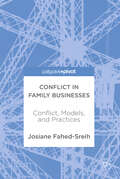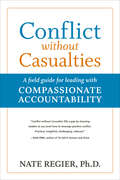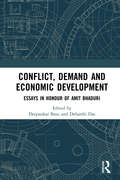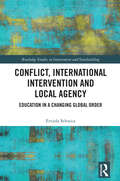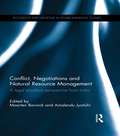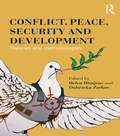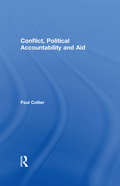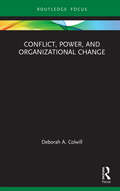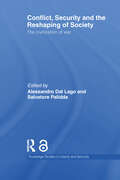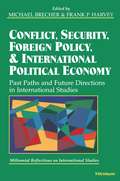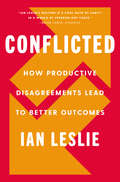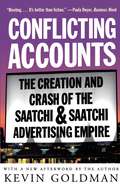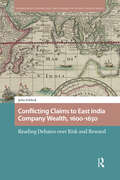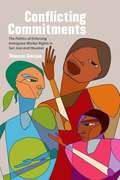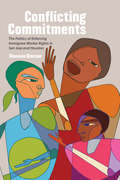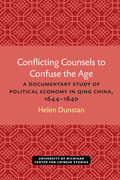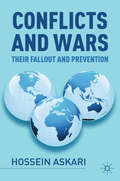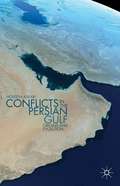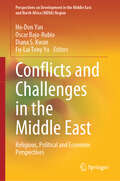- Table View
- List View
Conflict and Hostility in Hotels, Restaurants, and Bars
by Conrad LashleyThis book critically explores conflict and hostility in a range of hospitality settings and from a broad stakeholder perspective.The provision of accommodation, food, and drink in commercial settings has conflict at its core because the commercial transaction between hosts and guests can result in a clash of expectations between the server and served. These service encounters involve stakeholders other than immediate personnel and their clients; owners, managers, local communities, and regulatory and licensing authorities also have concerns about the hotels, restaurants, and bars in their midst. The book recognises that these different stakeholders frequently have common interests but are also in conflict as their needs and goals compete with others. By reviewing these multi-agenda perspectives, the contributors offer new insights into topics such as conflict theory within the hospitality industry, human trafficking, employee conflict, dysfunctional leadership, tall poppy syndrome, and the impacts of over-tourism on host communities.Written by leading international academics, this significant volume will be of interest to students, researchers, and academics interested in critical hospitality studies, sociology, and business, as well as anthropology and culture studies.
Conflict in Family Businesses: Conflict, Models, and Practices
by Josiane Fahed-SreihThis book presents methods for dealing with conflict in family firms. The first part of the book defines conflict in general and then in the context of family businesses. It then identifies several approaches to dealing with conflict. As the author makes clear, conflict can negatively impact the performance of a family firm while unresolved conflict often results in unsuccessful transition to the next generation. Therefore, she presents a model that looks at the causes of conflict and ways of resolving it. The second part of the book presents case studies of conflicts in family business, examining such companies as Gucci and L'Oreal and applying the theory. This book will serves as a foundational text in managing disputes in family enterprises.
Conflict on a Trading Floor (A)
by Joseph L. Badaracco Jr. Jerry UseemA junior salesperson on FirstAmerica Bank's trading floor is assisting a top salesperson, Linda, on a deal to finance the construction of a new cruise ship for Poseidon Cruise Lines. While the terms of the deal are being worked out, he realizes Linda has taken advantage of the Poseidon executives' unfamiliarity with complex financial structures to build an outrageously high profit margin into the deal. When the executives become suspicious of the prices FirstAmerica is quoting, Linda asks the protoganist to send them an intentionally misleading fax so that the deal will not be held up. Holding the personal belief that "before a blind man you shall not put a stumpling block," he does not know if he can bring himself to send the information.
Conflict without Casualties: A field guide for leading with Compassionate Accountability
by Nate RegierWhen leaders learn how to manage the emotions and drama in their organizations, conflict can be made healthier. Nate Regier uses the Drama Triangle Model and the Compassion Cycle to show leaders how to exercise compassion, not passion, and turn the negative energy of conflict into a positive energy for increased productivity and growth.Conflict without Casualties fills a gap by showing leaders at any level how to leverage positive conflict. Practical, insightful, challenging, relevant. -Dan Pink, New York Times bestselling authorMost organizations are terrified of conflict in the workplace, seeing it as a sign of trouble. But Nate Regier says conflict is really just a kind of energy and can be used in positive or negative ways. Handled incorrectly, conflict becomes drama, which is costly to companies, teams, and relationships at all levels. Avoiding, managing, or reducing conflict is a limited alternative. Instead, Regier explores the interpersonal dynamics that perpetuate drama in organizations through a concept called the Drama Triangle and offers an alternative: the Compassion Cycle. The Compassion Cycle allows leaders to balance compassion and accountability, transforming conflict into a growth experience that enables organizations to achieve significant gains in energy, productivity, engagement, and satisfaction in relationships. Provocative and illuminating, the concepts Regier shares will turn conflict from an experience to be avoided into a partner for positive change.
Conflict, Demand and Economic Development: Essays in Honour of Amit Bhaduri
by Deepankar Basu; Debarshi DasThis book presents a comprehensive overview of three key areas: heterodox macroeconomics, development economics and classical political economy. It offers an alternative macroeconomic framework to analyse policies with an emphasis on issues of equity and justice. With contributions by leading economists from across the world, it examines the growth and distribution of income; trade and finance in developing countries; classical political economy and Marxist theory; dualism in the US economy; economic crisis; and agrarian economy in poor countries. It explores themes such as the effect of an exogenous shock to wage share; Harrodian instability and Steindlian solutions; economics and politics of social democracy; the role of power in the macroeconomy; economic development through the promotion of domestic value chains; and reflections on primitive accumulation. Going beyond the neo-classical tradition, the volume opens up a new vista of economics by discussing unexplored questions. It provides a refreshing treatment of time-tested ideas as well as discussions of recent developments and current research. A major intervention in heterodox macroeconomics and a tribute to macroeconomist Amit Bhaduri, this book will be useful to scholars and researchers of economics, political economy, development studies, sociology, political science, public administration, economic theory, economic history, economic geography and critical studies, as well as professionals, economists and policymakers.
Conflict, International Intervention and Local Agency: Education in a Changing Global Order (Routledge Studies in Intervention and Statebuilding)
by Ervjola SelenicaThis book analyses international interventions in the education sector of conflict-affected countries in a world order shifting towards multipolarity.The work presents a genealogy of interventions in the education sector and unravels which agendas, among security, peace, humanitarianism and emergency, underpin such interventions. By using a comparative case study analysis across three regional expanses and, more specifically, three countries – Kosovo, Niger and Jordan – the book aims to contribute to reflections on the interaction between the national and the international. The research finds that an overarching stabilization imperative has informed international projects on education reform in the three respective countries. As the world is becoming increasingly multipolar and new threats are being framed as challenging and threatening the security of Western donors, local actors have more agency towards international templates of intervention. The book shows how contemporary processes of state- and nation-building in conflict-affected global peripheries are shaped by substantial forms of external intervention, in which practices of sovereignty and statehood are continuously supervised and negotiated. The author advocates for a re-adaptation of International Relations theoretical lenses, which goes beyond the methodological nationalism and disciplinary parochialism that has characterized much of the existing literature on state making/unmaking and international interventions in a globalized world.This book will be of much interest to students of education, international intervention, peace studies, security studies and International Relations.
Conflict, Negotiations and Natural Resource Management: A legal pluralism perspective from India (Routledge Explorations in Environmental Studies)
by Maarten Bavinck Amalendu JyotishiConflicts over natural resources abound in India, where much of the population is dependent on these resources for their livelihoods. Issues of governance and management are complicated by the competing claims of parallel legal systems, including state, customary, religious, project and local laws. Whereas much has been written about property rights, this unique collection takes a legal anthropological perspective to explore how the coexistence and interaction between multiple legal orders provide bases for claiming property rights. It examines how hybrid legal institutions have developed over time in India and how these impact on justice in the governance and distribution of natural resources. The book brings together original case studies that offer fresh perspectives on the governance of forests, water, fisheries and agricultural land in a diverse range of social and spatial contexts. This brand new research provides a timely and persuasive overview of the fundamental role of parallel legal systems in shaping how people manage natural resources. It will be of interest to scholars and practitioners of environmental law, property law, environmental politics, anthropology, sociology and geography.
Conflict, Peace, Security and Development: Theories and Methodologies
by Dubravka Zarkov Helen HintjensWhilst classical approaches linked development with peace, security has become central to understandings of both war and peacetime. This book uniquely reflects on how to deal with the convergence of war and peace in the context of global economic and geo-political development. It addresses methodological challenges in contemporary approaches to conflict, violence, security peace and development. Two dominant contemporary approaches are selected for debate on methodologies and ethical choices: rational choice and identity-based theorizing. The chapters are arranged as dialogues around contending approaches, to better understand how the inter-locking fields of violent conflict, peace, development and security can be researched and understood. The book considers how theoretical and methodological approaches relate to different ethical and political choices, including around engagement and intervention in the four interwoven fields. Theoretical, methodological and ethical issues emerge from the critical reviews of academic discourses and case-study based chapters from across the world, including Sri Lanka, Ghana, Colombia and Rwanda. This book is an invaluable resource for postgraduate students and researchers in Development Studies, Conflict Studies, Peace Studies and Security Studies.
Conflict, Political Accountability and Aid
by Paul CollierPaul Collier’s contributions to development economics,and in regard to Africa in particular, have marked him out as one of the most influential commentators of recent times. His research has centred upon the causes and consequences of civil war, the effects of aid, and the problems of democracy in low-income and natural-resource-rich societies. His work has also enjoyed substantial policy impact, having seen him sit as a senior adviser to Tony Blair’s Commission on Africa and addressed the General Assembly of the United Nations This collection of Collier’s major writings, with assistance from Anke Hoeffler and Jan Gunning, and accompanied by a new introduction, provide the definitive account of a wide range of macroeconomic, microeconomic and political economy topics concerned with Africa. Within macroeconomics, there is a focus on external shocks, exchange rate and trade policies, whilst microeconomic topics focus upon labour and financial markets, as well as rural development. Collier’s book The Bottom Billion had become a landmark book and this summation of the research underpinning it will be a superb guide for all those concerned with African development.
Conflict, Power, and Organizational Change (ISSN)
by Deborah A. ColwillA capacity for learning, adapting, and changing is an important facet of organizational resilience. What is involved in generative organizational change? Is it an event, a process, or constantly ongoing? What makes organizational change "good" for the organization? Who has the power to decide what is "good" for the organization and its members? How is it decided? What if there is strong disagreement or conflict? How is that handled? What is the role of organizational members and leaders in these discussions? As these questions demonstrate, the triad of change, power and conflict are intimately linked. The purpose of this book is to explore the topics of change, power and conflict as they relate to the experiences of everyday organizational life. It will provide readers the opportunity to reflect critically on their own local experience and involvement in organizations and to glean actionable wisdom for meaningful engagement and impactful contributions to their organization(s) in the present and future.Conflict, Power, and Organizational Change will be of interest to students, researchers, academics and professional colleagues interested in the fields of business and organizational studies, especially those wanting to get acquainted with the concepts of change, power and conflict in contemporary organizational settings.
Conflict, Power, and Organizational Change (Routledge Focus on Business and Management)
by Deborah A. ColwillA capacity for learning, adapting, and changing is an important facet of organizational resilience. What is involved in generative organizational change? Is it an event, a process, or constantly ongoing? What makes organizational change "good" for the organization? Who has the power to decide what is "good" for the organization and its members? How is it decided? What if there is strong disagreement or conflict? How is that handled? What is the role of organizational members and leaders in these discussions? As these questions demonstrate, the triad of change, power and conflict are intimately linked. The purpose of this book is to explore the topics of change, power and conflict as they relate to the experiences of everyday organizational life. It will provide readers the opportunity to reflect critically on their own local experience and involvement in organizations and to glean actionable wisdom for meaningful engagement and impactful contributions to their organization(s) in the present and future. Conflict, Power, and Organizational Change will be of interest to students, researchers, academics and professional colleagues interested in the fields of business and organizational studies, especially those wanting to get acquainted with the concepts of change, power and conflict in contemporary organizational settings.
Conflict, Security and the Reshaping of Society: The Civilization of War (Routledge Studies in Liberty and Security)
by Salvatore Palidda Alessandro Dal LagoA PDF version of this book is available for free in open access via www.tandfebooks.com as well as the OAPEN Library platform, www.oapen.org. It has been made available under a Creative Commons Attribution-Non Commercial-No Derivatives 3.0 license and is part of the OAPEN-UK research project. This book is an examination of the effect of contemporary wars (such as the 'War on Terror') on civil life at a global level. Contemporary literature on war is mainly devoted to recent changes in the theory and practice of warfare, particular those in which terrorists or insurgents are involved (for example, the 'revolution in military affairs', 'small wars', and so on). On the other hand, today's research on security is focused, among other themes, on the effects of the war on terrorism, and on civil liberties and social control. This volume connects these two fields of research, showing how 'war' and 'security' tend to exchange targets and forms of action as well as personnel (for instance, the spreading use of private contractors in wars and of military experts in the 'struggle for security') in modern society. This shows how, contrary to Clausewitz's belief war should be conceived of as a "continuation of politics by other means", the opposite statement is also true: that politics, insofar as it concerns security, can be defined as the 'continuation of war by other means'. This book will be of much interest to students of critical security studies, war and conflict studies, terrorism studies, sociology and IR in general. Salvatore Palidda is Professor of Sociology in the Faculty of Education at the University of Genoa. Alessandro Dal Lago is Professor of Sociology of Culture and Communication at the University of Genoa.
Conflict, Security, Foreign Policy, and International Political Economy
by Frank P. Harvey Michael BrecherNo study of international relations is complete without consideration of foreign policy processes and an understanding of state security, conflict in global politics, and the relationship between the world economy and international behavior. Conflict, Security, Foreign Policy, and International Political Economy: Past Paths and Future Directions in International Studies consists of twelve original essays that point out the strengths and weaknesses of current approaches in these research areas as well as suggest agendas for future research.
Conflicted: How Productive Disagreements Lead to Better Outcomes
by Ian LeslieDrawing on advice from the world’s leading experts on conflict and communication—from relationship scientists to hostage negotiators to diplomats—Ian Leslie, a columnist for the New Statesman, shows us how to transform the heat of conflict, disagreement and argument into the light of insight, creativity and connection, in a book with vital lessons for the home, workplace, and public arena.For most people, conflict triggers a fight or flight response. Disagreeing productively is a hard skill for which neither evolution or society has equipped us. It’s a skill we urgently need to acquire; otherwise, our increasingly vociferous disagreements are destined to tear us apart. Productive disagreement is a way of thinking, perhaps the best one we have. It makes us smarter and more creative, and it can even bring us closer together. It’s critical to the success of any shared enterprise, from a marriage, to a business, to a democracy. Isn’t it time we gave more thought to how to do it well?In an increasingly polarized world, our only chance for coming together and moving forward is to learn from those who have mastered the art and science of disagreement. In this book, we’ll learn from experts who are highly skilled at getting the most out of highly charged encounters: interrogators, cops, divorce mediators, therapists, diplomats, psychologists. These professionals know how to get something valuable – information, insight, ideas—from the toughest, most antagonistic conversations. They are brilliant communicators: masters at shaping the conversation beneath the conversation. They know how to turn the heat of conflict into the light of creativity, connection, and insight. In this much-need book, Ian Leslie explores what happens to us when we argue, why disagreement makes us stressed, and why we get angry. He explains why we urgently need to transform the way we think about conflict and how having better disagreements can make us more successful. By drawing together the lessons he learns from different experts, he proposes a series of clear principles that we can all use to make our most difficult dialogues more productive—and our increasingly acrimonious world a better place.
Conflicten en agressie in de medische praktijk
by Geuk Schuur Douwe VriesAgressief en zelfs gewelddadig gedrag van cliënten is een verschijnsel waarmee artsen en hun assisterende medewerkers helaas steeds vaker worden geconfronteerd - niet alleen in de poli of praktijkruimte, maar ook buiten werktijd. Deze overlast kan uiteenlopen van hinderlijk gedrag of verbale intimidatie tot grove beledigingen en zelfs lichamelijk geweld. Conflicten en agressie in de medische praktijk, geschreven voor huisartsen, medisch specialisten en hun assistenten, dient als een praktische handleiding om agressief gedrag te voorkomen of, als dit toch mocht optreden, het in te tomen. Daarnaast is dit boek geschikt voor overige beroepsbeoefenaren die contact hebben met zorgvragers, zoals bedrijfsartsen, apothekers of maatschappelijk werkers. De thema's in dit boek zijn in oplopende mate van ernst gerangschikt. Bij elk probleemsituatie wordt de vraag gesteld: hoe kan men bij de confrontatie zicht op de situatie krijgen, controle over eigen emoties en het eigen gedrag houden, de leiding behouden en van daaruit de-escalerend optreden? Doel is hierbij te leren de conflictsituatie te beheersen en deze een voor alle partijen constructieve, zinvolle wending te geven. De hoofdstukken in dit boek kennen een uniforme opbouw. Elk hoofdstuk begint met een casus, waarna overwegingen volgen. In het onderdeel 'Reflectie' wordt de beschreven reactie van de handelende beroepsbeoefenaren kritisch belicht. Elk hoofdstuk wordt met adviezen afgesloten.
Conflicting Accounts: The Creation and Crash of the Saatchi and Saatchi Advertising Empire
by Kevin GoldmanA Simon & Schuster eBook. Simon & Schuster has a great book for every reader.
Conflicting Claims to East India Company Wealth, 1600-1650: Reading Debates over Risk and Reward (Entanglements, Interactions, and Economies in the Early Modern World)
by Julia SchleckCentered on moral critiques of wealth and the unequal distribution of risks and rewards in the lengthy voyages required by the East Indies trade, this book examines the debates surrounding England’s earliest global trading ventures. Arguments over the staggering loss of lives and national resources and struggles over control of the new trade in luxuries reveal the forging of rationales justifying the new capitalist inequalities. Yet Company servants traveling abroad to conduct the risky trade resisted this newly coalescing social formation through strategic disobedience to their masters’ will, controlling information and promoting ignorance when it served their financial and sexual purposes. Conflicting Claims to East India Company Wealth, 1600–1650 interrogates the forces that shaped England’s earliest forays into capitalist imperialism by tracing the battles over corporate control of men’s finances, marriages, and bare survival at the dawn of its global trade
Conflicting Commitments
by Shannon GleesonIn Conflicting Commitments, Shannon Gleeson goes beyond the debate over federal immigration policy to examine the complicated terrain of immigrant worker rights. Federal law requires that basic labor standards apply to all workers, yet this principle clashes with increasingly restrictive immigration laws and creates a confusing bureaucratic terrain for local policymakers and labor advocates. Gleeson examines this issue in two of the largest immigrant gateways in the country: San Jose, California, and Houston, Texas. Conflicting Commitments reveals two cities with very different approaches to addressing the exploitation of immigrant workers-both involving the strategic coordination of a range of bureaucratic brokers, but in strikingly different ways. Drawing on the real life accounts of ordinary workers, federal, state, and local government officials, community organizers, and consular staff, Gleeson argues that local political contexts matter for protecting undocumented workers in particular. Providing a rich description of the bureaucratic minefields of labor law, and the explosive politics of immigrant rights, Gleeson shows how the lessons learned from San Jose and Houston can inform models for upholding labor and human rights in the United States.
Conflicting Commitments: The Politics of Enforcing Immigrant Worker Rights in San Jose and Houston
by Shannon GleesonIn Conflicting Commitments, Shannon Gleeson goes beyond the debate over federal immigration policy to examine the complicated terrain of immigrant worker rights. Federal law requires that basic labor standards apply to all workers, yet this principle clashes with increasingly restrictive immigration laws and creates a confusing bureaucratic terrain for local policymakers and labor advocates. Gleeson examines this issue in two of the largest immigrant gateways in the country: San Jose, California, and Houston, Texas. Conflicting Commitments reveals two cities with very different approaches to addressing the exploitation of immigrant workers —both involving the strategic coordination of a range of bureaucratic brokers, but in strikingly different ways. Drawing on the real life accounts of ordinary workers, federal, state, and local government officials, community organizers, and consular staff, Gleeson argues that local political contexts matter for protecting undocumented workers in particular. Providing a rich description of the bureaucratic minefields of labor law, and the explosive politics of immigrant rights, Conflicting Commitments shows how the lessons learned from San Jose and Houston can inform models for upholding labor and human rights in the United States.
Conflicting Counsels to Confuse the Age: A Documentary Study of Political Economy in Qing China, 1644–1840 (Michigan Monographs In Chinese Studies #73)
by Helen DunstanConflicting Counsels to Confuse the Age translates and analyzes thirty-eight memorials to the throne and other Qing documents dealing with important issues of Chinese political economy, providing thoughtful and provocative commentary. Subjects covered by the texts include water control, mining, grain trade, pawnshops, brewing, and commercial shipping. The documents also contain detailed discussions of how the state should control wealth, self-interest, profit, hoarding, and the market. In translating these primary sources, Helen Dunstan invites fellow specialists in Chinese studies, including Qing historians, to watch Qing officials and others thinking through problems of political economy and developing arguments to persuade colleagues or superiors. By emphasizing their rhetorical nature and genre conventions, Dunstan offers a reminder that it is improper to use the “information” in such texts without attention to the author’s purpose, and without grasping the rhetorical structure of the text as a whole. As a model for close reading, Conflicting Counsels aims to induce greater sensitivity to the nature of Qing records. The second purpose of Conflicting Counsels is to help dispel the notion that economic liberalism is necessarily a Western, “modern” phenomenon. Many of the texts translated record areas of tension and controversy in eighteenth-century approaches to a central project of Confucian paternalist administration, “nourishing the people” (yangmin). Although Dunstan attempts to present both sides fairly, some materials included present the opinion that, in certain vital matters, it was better for the state to stand aside, and leave society’s own economic institutions, trade in particular, to handle things. While not a majority, the texts that build some kind of market mechanism argument should be of greatest interest to Qing historians.
Conflicting Responsibilities
Presents a framework for resolving issues in which managers' responsibilities--to shareholders, employees, other stakeholder groups, and to their own values and commitments in life--conflict with each other. The framework analyzes these issues in terms of duties, consequences, personal values, and practicality. Provides an analytic framework for a course or module on business ethics, that brings together basic considerations in moral philosophy with practical pressures, perspectives, and concerns of business executives.
Conflicts And Wars: Their Fallout and Prevention
by Hossein AskariExplaining how the price of aggression is low enough that governments do not avoid conflicts, this book uses examples drawn from recent conflicts in the Persian Gulf to examine many dimensions of costs incurred by warfare and proposes a private sector solution to warfare's low cost.
Conflicts In The Persian Gulf
by Hossein AskariAnalyzing the origins of conflicts and wars in the Persian Gulf, this study assesses the conflicts' shared trajectories and fallouts. Although the origins of conflicts are varied (sectarian, religious, ethnic, and tribal, over territory and over resources), as conflicts evolve, the quest for "revenge" and the desire to settle old scores is only one, apparent fuel, which belies a more essential one. The evolution of most conflicts can, over time, be traced to a single source the struggle for power and control over resources. Hossein Askari argues that reconciliation will require the simultaneous adoption of foundational political, social, and economic reforms by the countries in the region, as well as the cooperation of the global powers, especially the United States, to end support of dictators and reduce the human costs of aggression. The creation of a just society with freedom and equal opportunities for all is a necessary precondition if peace and prosperity are to flourish. "
Conflicts and Challenges in the Middle East: Religious, Political and Economic Perspectives (Perspectives on Development in the Middle East and North Africa (MENA) Region)
by Fu-Lai Tony Yu Oscar Bajo-Rubio Diana S. Kwan Ho-Don YanThis book examines religious, political, and economic conflicts in the Middle East. Written by experts and scholars from various fields, it provides a better understanding of the interwoven impact among religious, political, and economic conflicts in the Middle East. The contributions cover the most important and controversial issues in world affairs, including confrontations between Christianity and Islam and between Sunnis and Shiites; the disputes between Israel and Palestine, the Russian-Ukrainian War, ISIS, competition for oil resources, the Muslim Brotherhood, refugee entrepreneurs, human trafficking, and women's empowerment, etc. The book is an important reference work on the Middle East. It appeals to scholars and students of Middle East studies, international relations, peace and conflicts studies, and related fields, as well as practitioners and policymakers.

